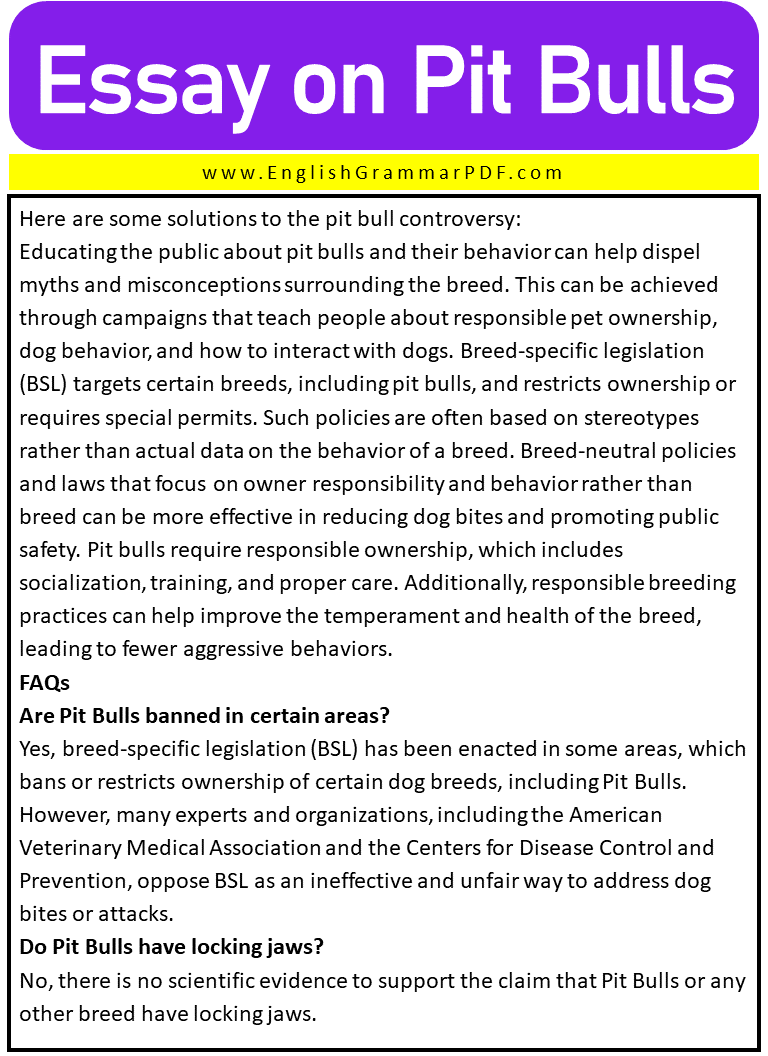Essay on Pit Bulls
Outlines of Essay
- Introduction
- Characteristics of Pit Bulls
- Positive Aspects of Pit Bulls
- Negative Perceptions of Pit Bulls
- Solutions to Pit Bull Controversy
Introduction
Pit bulls are a type of dog that was originally bred for bull-baiting and dog-fighting in 19th-century England. They were developed by crossing terriers with bulldogs, creating a powerful and athletic dog with a strong jaw and tenacious spirit. In the early 20th century, pit bulls were brought to the United States and became popular as working dogs on farms and ranches. They were also used as family pets and as police and military dogs. During World War I, pit bulls became symbols of American patriotism and loyalty. In the 1970s, pit bulls began to gain a negative reputation due to their use in dog-fighting rings and high-profile attacks on humans. In response, many communities enacted breed-specific legislation (BSL) to ban or restrict pit bulls. However, many animal advocates and experts argue that breed-specific legislation is ineffective and unfair and that pit bulls can be safe and loving pets with proper training and socialization.
Today, pit bulls continue to be popular pets in many parts of the world, although they still face discrimination and prejudice in some communities. Many organizations, such as the American Society for the Prevention of Cruelty to Animals (ASPCA) and the American Kennel Club (AKC), are working to promote responsible ownership and education about pit bulls and other dog breeds.
Characteristics of Pit Bulls
Pit Bulls are a group of muscular and medium-sized dogs that typically weigh between 30 to 70 pounds. They have short, glossy coats that can come in a variety of colors, such as black, brown, brindle, and white. Their most distinctive physical feature is their broad, powerful jaw and head. Pit Bulls are often described as affectionate, loyal, and highly trainable. They are energetic and require plenty of exercise and mental stimulation. With proper training and socialization, they can be excellent family pets and are often good with children. However, it is important to note that like all dogs, individual temperament can vary depending on genetics, early socialization, and training.
Positive Aspects of Pit Bulls
Pit bulls are often known for their loyalty and protective nature. They can form strong bonds with their owners and are known to be excellent watchdogs. With proper training and socialization, pit bulls can make excellent family pets and are often very affectionate toward their owners. Pit bulls are also intelligent and trainable. They are known to be quick learners and are often used in a variety of working roles, such as therapy dogs, police dogs, and search and rescue dogs. Pit bulls excel in these roles due to their intelligence and strong work ethic. Pit bulls have also been successful in various sports such as weight pulling, agility, and obedience competitions. They have a natural athleticism and are often eager to please their owners, making them a joy to train.
Negative Perceptions of Pit Bull
Pit Bulls have gained a negative reputation in popular culture, largely due to a combination of media portrayal, breed-specific legislation, and their history in dog fighting.
Media portrayal has played a significant role in shaping public perceptions of Pit Bulls. Unfortunately, the media often focuses on negative stories involving Pit Bulls, such as when they are involved in attacks or bites. This has contributed to a skewed perception that all Pit Bulls are inherently aggressive or dangerous, which is not true. Breed-specific legislation (BSL) has also contributed to negative perceptions of Pit Bulls. BSL is a set of laws or regulations that restrict or ban certain breeds of dogs based on their appearance, without regard to their behaviour or individual temperament. Many municipalities and countries have enacted BSL targeting Pit Bulls specifically, which often results in the euthanasia of healthy dogs and is widely criticized by animal welfare organizations. Lastly, the history of Pit Bulls in dogfighting has also contributed to their negative perception. In the past, Pit Bulls were used in dogfighting rings, and their breeding was focused on aggression and fighting ability. Although dogfighting is illegal in many countries, there are still some people who continue to breed and train Pit Bulls for this purpose.
Solutions to Pit Bull Controversy
The pit bull controversy is a highly debated topic that has generated a lot of emotional responses from both sides of the argument. While some people believe that pit bulls are inherently dangerous, others argue that it’s the way they are raised and treated that makes them aggressive. Here are some solutions to the pit bull controversy:
Educating the public about pit bulls and their behavior can help dispel myths and misconceptions surrounding the breed. This can be achieved through campaigns that teach people about responsible pet ownership, dog behavior, and how to interact with dogs. Breed-specific legislation (BSL) targets certain breeds, including pit bulls, and restricts ownership or requires special permits. Such policies are often based on stereotypes rather than actual data on the behavior of a breed. Breed-neutral policies and laws that focus on owner responsibility and behavior rather than breed can be more effective in reducing dog bites and promoting public safety. Pit bulls require responsible ownership, which includes socialization, training, and proper care. Additionally, responsible breeding practices can help improve the temperament and health of the breed, leading to fewer aggressive behaviors.
FAQs
Are Pit Bulls banned in certain areas?
Yes, breed-specific legislation (BSL) has been enacted in some areas, which bans or restricts ownership of certain dog breeds, including Pit Bulls. However, many experts and organizations, including the American Veterinary Medical Association and the Centers for Disease Control and Prevention, oppose BSL as an ineffective and unfair way to address dog bites or attacks.
Do Pit Bulls have locking jaws?
No, there is no scientific evidence to support the claim that Pit Bulls or any other breed have locking jaws.
Are Pit Bulls good guard dogs?
Pit Bulls are naturally protective of their families and can make good guard dogs. However, they may not be suitable for all households due to their size and energy level. Proper training and socialization are important to ensure that Pit Bulls can distinguish between a real threat and a harmless situation.
Download the PDF of Essay on Pit Bulls





More Essays:


